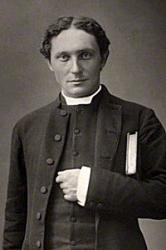
1851 - 1928 Person Name: Arthur James Mason, 1851-1928 Translator of "Not a thought of earthly things!" in CPWI Hymnal Mason, Arthur James, M.A., was educated at Trinity College, Cambridge; B.A., in honours, 1872. He became a Fellow of his college in 1873, and Assistant Tutor in 1874. Ordained in 1874, he has since held some important appointments, and is now (1891), Hon. Canon and Canon Missioner of Truro, and Vicar of All Hallows, Barking, City of London, 1884, &c. To the 1889 Supplemental Hymns to Hymns Ancient & Modern, he contributed a translation of the Danish hymn: "0 Jesu! søde Jesu, dig" ("0 Jesu, Blessed Lord, to Thee"), Holy Communion, and the following original hymns:—
1. Church of the living God. The Holy Catholic Church.
2. Hail, Body true, of Mary born, and in the manger laid. Holy Communion.
3. Look down upon us, God of grace . Holy Communion.
4. 0 God, to know that Thou art just. Home Missions.
--John Julian, Dictionary of Hymnology, Appendix, Part II (1907)
===================
Mason, A. J., p. 1579, i., son of G. W. Mason, was b. May 4, 1851. Dr. Mason has had a most distinguished career, and has held important appointments in addition to those named on p. 1579, i., including that of Select Preacher at Oxford. In 1895 he became Lady Margaret Professor at Cambridge, and Canon of Canterbury; and in 1903 Master of Pembroke Coll., Cambridge. In addition to other works he published in 1875 The Persecution of Diocletian, and in 1902 Ministry of Conversion. His hymns, noted on p. 1579, i., were retained in the revised edition of Hymns Ancient & Modern, 1904 (Nos. 1, 2, 3, were written about 1886, and 4 in 1874). His hymn on the Seventh Word on the Cross, "The life-long task was done," written in 1902, was also included therein. His translations of the "Salve, festa dies" hymns for Easter, &c, are annotated under their Latin first lines.
--John Julian, Dictionary of Hymnology, New Supplement (1907)
A. J. Mason


 My Starred Hymns
My Starred Hymns




